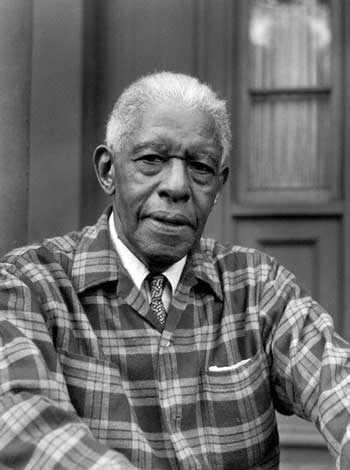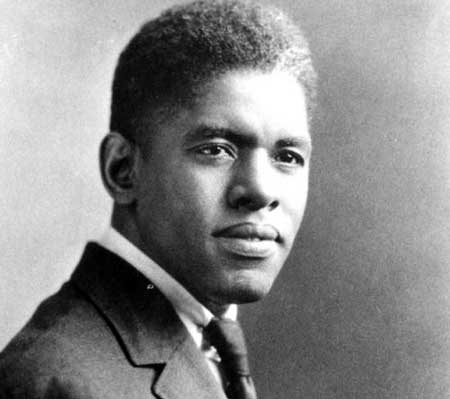Play (2013), with music
by Daniel Beaty
Directed by David Dower
Music Direction by Jonathan Mastro
ArtsEmerson
Paramount Theater Mainstage, Boston
January 27 – February 8, 2015
With Elijah Rock (Roland Hayes), Harriett D. Foy (Angel Mo), Nehal Joshi (Teacher and others)

Born in Georgia in 1887 to tenant farmers on a former plantation where his mother had been a slave – Hayes showed an early interest in singing. Inspired by both of his musical parents, Hayes, after the death of his father at the age of eleven, learned Negro Spirituals at the church founded by his mother in Tennessee. At the age of twelve, hearing a recording of Enrico Caruso singing opera, Hayes attempted to get training at Fisk University in Nashville, despite having had only an eighth-grade education. After singing an audition there he convinced the university to admit him.
After a concert tour across the country, Hayes came to Boston where he performed at Jordan Hall, which he rented at his own expense, and then, in 1917, at Symphony Hall, where he sung to a sold out house. Hayes subsequently toured in Europe and, in 1920, performed for King George V and Queen Mary at Buckingham Palace. His official debut was given in 1923 in Boston at Symphony Hall with Pierre Monteux conducting the Boston Symphony Orchestra, the first African-American soloist to appear with the BSO. He married Alzada Mann in 1932 and they named their daughter Afrika.

Several racial responses to Hayes were noteworthy.
In 1923, while performing in Berlin, he faced an angry audience which had been fed by nastily derogatory journalism. When Hayes began to sing Schubert after standing still in front of a jeering crowd, the audience’s mood completely changed and the concert was considered a great success.
In 1942, Hayes’ wife and daughter in Georgia and were vehemently opposed when they tried to sit in a white-only section of a shoe store. Hayes confronted the store owner and was beaten, along with his wife.
Among other academic appointments, Hayes was on the faculty at the noted Black Mountain College in North Carolina in 1945, giving a concert there that was memorable.
Playwright Beaty has consolidated many of these events from Hayes’ life into a concise, but informative and entertaining, hour and a half of music and drama. Selecting to highlight Hayes’ mother (Harriett D. Foy) and a variety of his mostly white music teachers (Nehal Joshi), Beaty weaves a narrative that demonstrates Hayes’ talents and ambitions.
Elijah Rock (Roland Hayes) gives a noteworthy performance, both dramatically and musically. All of the principals carry through the mosaic of events – many of those described above are included in the narrative – as well as giving a charming musical account.
This is a delightfully intimate chamber piece, a quiet biography, told in song, about a noted character in American musical history, and someone whose career hovered in many ways around Boston. Really the first African-American classical singer, Hayes later paved the way for the vocal greats Marian Anderson and Paul Robeson. Deserving of being widely heralded, Hayes, in this graceful tribute, receives an important gesture in that direction. It adeptly commemorates and celebrates the noteworthy career of a dedicated musical humanist.
– BADMan
Leave a Reply